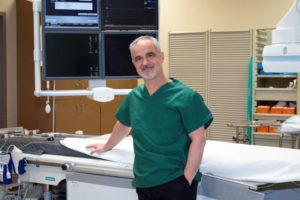Dr. Ciuffo Performs a Variety of Minimally Invasive Heart Surgery Procedures!
Click the “Read More” link for more info and an in depth coverage and explanation of each cardiac procedure and heart condition from Dr. Ciuffo. Use the search function and the menu on the left hand side for any specific topic you are interested in learning more about or visit our blog page for more minimally invasive heart surgery topics. We welcome all your questions and comments, feel free to contact us online or call us at (712) 294-7055.
Bloodless Heart Surgery

Aortic Valve Replacement
 The normal aortic valve has three leaflets called cusps and is positioned at the exit site of the left ventricle (our main pump) of the heart. It allows one-way flow of fresh oxygenated blood out of the heart and into the aorta (our main pipeline) by opening and closing with each heartbeat. There are essentially two types of malfunctions that can get us in trouble and can coexist in the same patient:
The normal aortic valve has three leaflets called cusps and is positioned at the exit site of the left ventricle (our main pump) of the heart. It allows one-way flow of fresh oxygenated blood out of the heart and into the aorta (our main pipeline) by opening and closing with each heartbeat. There are essentially two types of malfunctions that can get us in trouble and can coexist in the same patient:
- The valve is too narrow and stiff and does not open wide (Aortic Valve Stenosis)
- The valve does not close well and leaks (Aortic Valve Insufficiency)
Biological or Mechanical Heart Valve
 The technical evolution and research commitment to create the perfect heart valve substitute has been carrying on for the last 45 years. The design and engineering behind contemporary valves is directed to improved reliable and durable performance. Today we can pick a variety of heart valve prostheses from our surgical supply shelves. They come in different sizes and designs to fit the individual patients’ needs. The choice of a valve substitute is in fact tailored to the patient. It takes into account multiple factors, such as age, sex, personal preferences, level of expected physical activity, plans to get pregnant, etc. We can essentially divide the valve prostheses in two broad categories, each with its own pros and cons: mechanical valves and biological valves.
The technical evolution and research commitment to create the perfect heart valve substitute has been carrying on for the last 45 years. The design and engineering behind contemporary valves is directed to improved reliable and durable performance. Today we can pick a variety of heart valve prostheses from our surgical supply shelves. They come in different sizes and designs to fit the individual patients’ needs. The choice of a valve substitute is in fact tailored to the patient. It takes into account multiple factors, such as age, sex, personal preferences, level of expected physical activity, plans to get pregnant, etc. We can essentially divide the valve prostheses in two broad categories, each with its own pros and cons: mechanical valves and biological valves.
Mitral Valve Repair
 Our minimally invasive heart surgery techniques allow us to replace or repair these defective valves reliably and through a small chest wall incision, with less bleeding and pain, a quick recovery and excellent cosmetic results. In most women the surgical incision can be actually hidden underneath the breast. Oftentimes a floppy mitral valve can be repaired rather than replaced, avoiding altogether the need for blood thinners and decreasing the chance of embolic events (i.e. strokes) more commonly seen if a valve replacement with a mechanical valve is performed instead of a repair. Patients with significant mitral regurgitation (leaky valve) should be aggressively evaluated and followed up to decide if and when they need a surgical correction that could dramatically improve their quality of life and longevity.
Our minimally invasive heart surgery techniques allow us to replace or repair these defective valves reliably and through a small chest wall incision, with less bleeding and pain, a quick recovery and excellent cosmetic results. In most women the surgical incision can be actually hidden underneath the breast. Oftentimes a floppy mitral valve can be repaired rather than replaced, avoiding altogether the need for blood thinners and decreasing the chance of embolic events (i.e. strokes) more commonly seen if a valve replacement with a mechanical valve is performed instead of a repair. Patients with significant mitral regurgitation (leaky valve) should be aggressively evaluated and followed up to decide if and when they need a surgical correction that could dramatically improve their quality of life and longevity. 
Coronary Surgery
 Minimally Invasive Coronary Surgery techniques have changed the way we cure coronary artery disease. In spite of all the exciting progress in the field of interventional cardiology (stents and angioplasties), many patients are much better off with coronary bypass surgery to enjoy a durable and reliable solution of their problems and a much better quality of life.
Minimally Invasive Coronary Surgery techniques have changed the way we cure coronary artery disease. In spite of all the exciting progress in the field of interventional cardiology (stents and angioplasties), many patients are much better off with coronary bypass surgery to enjoy a durable and reliable solution of their problems and a much better quality of life.
There is a huge body of literature in the field of cardiovascular disease that strongly supports the use of coronary bypass surgery to insure longevity and a life free of anginal symptoms (chest pain, shortness of breath).
By using minimally invasive techniques our patients get the best treatment available for their coronaries without the conventional large surgical incisions and without stopping the heart. Read more and become a truly informed consumer.
Hybrid Valve and Coronary Surgery
 Minimally invasive heart surgery techniques can be married to stents in many different situations to truly achieve “the best of both worlds”. The planned combination of these minimally invasive procedures delivers a complete cure of many heart conditions in a low-impact, minimally invasive way with a fast recovery, tiny incisions, less pain and superior cosmetic results.
Minimally invasive heart surgery techniques can be married to stents in many different situations to truly achieve “the best of both worlds”. The planned combination of these minimally invasive procedures delivers a complete cure of many heart conditions in a low-impact, minimally invasive way with a fast recovery, tiny incisions, less pain and superior cosmetic results.
Our patients undergo successful treatments of all their coronary blockages and/or valve disease by using a combination of techniques that gave them a quick uneventful recovery, no need for any blood transfusions and excellent cosmetic results.

Atrial Myxoma and ASD Repair
 Six babies out of 1,000 are born with an atrial septal defect (ASD), a hole through the wall that normally separates the right side of the heart from the left.
Six babies out of 1,000 are born with an atrial septal defect (ASD), a hole through the wall that normally separates the right side of the heart from the left.
A hole in that position means that a portion of the oxygenated blood will flow back to the right side instead of going to the rest of the body.
Patients can consider surgical therapy, catheter therapy, or medical therapy.
Inoperable Heart Surgery Patients
 An inoperable diagnosis for high risk heart patients can have devastating and terminal consequences. Usually, something can be done and patients need a second opinion from an expert like Dr. Ciuffo. If you have been labeled as inoperable, follow these next steps:
An inoperable diagnosis for high risk heart patients can have devastating and terminal consequences. Usually, something can be done and patients need a second opinion from an expert like Dr. Ciuffo. If you have been labeled as inoperable, follow these next steps:
- Ask your local cardiologist and heart surgeon why you are an inoperable heart patient and write down their answers.
- Ask what your chances are without surgery.
- Obtain copies of all your imaging studies.
- Contact our center with expertise in high risk cardiac surgery cases and request an evaluation of your case.

